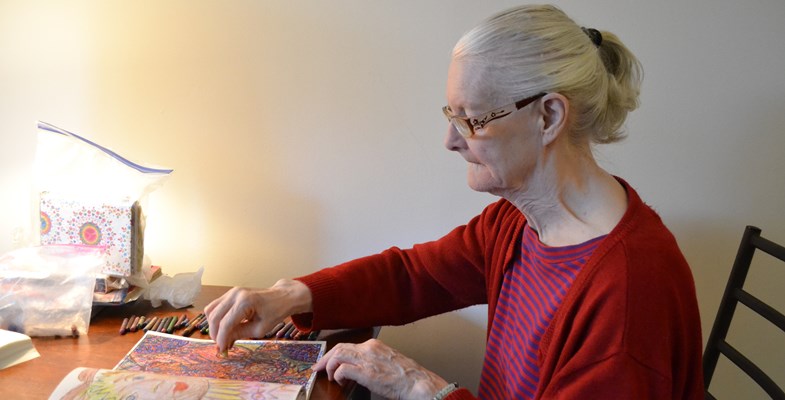Pamela lived in long-term care facilities for nearly ten years, according to her conservator. He first met Pamela when she needed to be hospitalized to treat delusions and other challenging behaviors while she was living alone in the community. Although he had his doubts whether she would be able to live in the community again after nearly a decade in skilled care, he considers this a “really good discharge” as Pamela has maintained her health and well-being very well in the community with the help of Money Follows the Person. The transition coordinator was instrumental in making this a quick and smooth process along with the facility social worker.
Pamela has lived with a great 24/7 personal care assistant for almost a year and a half. The regular live-in PCA gets respite from another live-in PCA and recently returned from a week away with no interruption in Pamela’s routine or health. After her initial MFP transition, Pamela was able to move to a different apartment in the same building so as not to disturb other residents because she can express herself loudly at times. The routine of regular exercise three times a day, weather permitting, or walking in place in the apartment, as well as creative expression through coloring or painting and singing, has given Pamela stability in her own apartment once again. She reports: “I walk very well with my walker and feel I have made an improvement.” Pamela enjoys living on her own, saying “hello” to neighbors and having more privacy. Eating is easier with the live-in PCA’s assistance and her mental health continues to be stable since transitioning.
Details of Pamela’s early life are sparse, and she is not currently in touch with any family members. Her conservator believes she spent time in New York City and was well-educated. Though Pamela has some difficulties with her memory and her speech can be difficult to understand, she shared some memories, which included working in graphic design after studying at night. She conveys a lifelong interest in the arts and athletics. More of her memories include being an “amazing dancer and competing in high school” and painting: “I have painted for years!” Pamela’s other recollections of her life story included knitting, playing tennis where she remembers “beating the pants off of them” and swimming in Jamaica. She recalls traveling with a relative to Newport’s U.S. Naval War College as well as to Maine. When asked if she painted her memories of people and places, she said, “No, but maybe I should. That’s a good idea.”
Pamela has lots of energy and a joyful spirit humming along while focusing intently on bringing the image to life through color. She enjoys painting outside or plein air, remembering painting the elm and oak trees, and flowering bushes while at one of the long-term care facilities. Pamela expresses her emotions (light or dark) with pure abandon!
Her philosophy for living is simple yet challenging for many, “To come to work every day, take what your family gave you, use your abilities and learn to take myself, one step at a time.”
Read the CT Money Follows the Person Quarterly Report
Add to Favorites
